Christmas time is nearly upon us, and although this time period is one that brings about a lot of joy and happiness for many families, for others this might also be cause of stress, as well as a more difficult period of time altogether. It is important that we are empathetic to different realities, and that we observe how we can support each other in the best manner possible.
We are well aware that at Christmas time and during the holidays there are many more activities that are held than usual, together with meetings with different people, as well as bringing with them a stronger sense of stimulation overall. Sometimes we even see certain parents rushing from one activity to the other together with their children (where I am one of these very same types of parents 😊), and at times we do not always realise how, to a certain extent, we may be cramming many more activities than our children are able to experience in a regulated manner. There are also children who show more sensitivity than others, as due to different reasons, with amongst these being: their temperament, times of change that they may be going through, as well as physical or neurobiological conditions, including autism and attention deficit hyperactivity disorder (ADHD). When children find it difficult to regulate themselves, there is a greater probability of a ‘meltdown’. Through this article, I would like to share some ideas with you, which we can put into practice as parents, so as to be able to help our children during this festive period.
– Create a calm and quiet space, where children would be able to take a ‘break’ from the strong sense of stimulation brought about by the festive holidays

When children become overstimulated, there is a greater chance of ‘tantrums’ being thrown, since they would be even more tired and emotional as a result of all that they would be experiencing through their very own senses – a lot of noise, light, people being next to them or in their vicinity, several sweets and sugar, as well as many disruptions from one thing to another, etc. Try to find a quieter place away from people and noise from time to time, where the children themselves would be able to find a certain peace of mind, as well as to take a break. If the children still have the tendency to sleep during the day, try to find a good location, even if this would be outside, where they would be more calm, so as to help them rest for a while. Keep in mind that children who are tired are not going to derive much enjoyment from several activities, since they would not have enough energy for them. As a personal example from my end – for ourselves, most of the time it is a common tradition in our family that we host a big Christmas dinner, where we invite all of our family members, for which event we would be around 20 persons in total. This means that there would be quite a strong sense of stimulation; therefore, in order to help my little ones through the experience of undergoing such an event, as well as to try to prevent some sort of ‘meltdown’, I usually invite my young children so that we may go to a quieter room together, where for example we would be able to read a short story, or play alone and quietly together for a short while.
This, from my personal experience, is something that helps the children to further regulate themselves so that they would then be able to enjoy themselves better. In addition to this, in such events, I tend to be more lax on the use of ‘screentime’. Where I am usually careful to keep to the rule of not more than one hour daily, during such events I allow my children to watch more television than usual, since this further helps them, as on a personal basis, to feel more relaxed and to be able to take a break from all of the ongoing commotion. Furthermore, when I have more than a single invitation in one particular day, I try and make an effort to take my young ones back home, if only just for a short while, as between one thing and another so that the day itself feels less like running a race, and where at the same time we would be able to wind down and enjoy things more. Something that also helps me is when I show empathy with my children – personally, even I get tired out as a result of several celebratory parties held in a row, let alone small children.
– Make sure to observe, so that you may recognise the signs of when your children feel tired or very emotional
By observing our children, there would be a greater chance of noticing in the case that they are getting tired and/or that there is the likelihood of a ‘meltdown’. When we would be seeing certain signs such as, for example, observing them to be rubbing their eyes, staring at nothing in particular, losing their patience much more quickly, etc, we would be in a better position to help them to get out of that situation, and to be able to help them to rest, as well as to regulate themselves more. There is no magic formula, however for many children it helps them that they have that one favourite toy at hand which calms them down; for others, especially for those children who tend to experience more ‘sensory issues’, the use of ‘headphones’ in order to take a break from the noise can further help as well.

– Help your children to feel more in control, by not forcing them to hug or to kiss people that they do not feel comfortable with or that they do not know that much
Children should always be given the choice of how they wish to greet the individual, even if they are familiar with the person in question. Something which I find that helps my children is that, as an example, I ask them: “How would you like to say hello (or bye) to your aunt?” It might be that if this is a person that they haven’t seen in a while, they would be more self-conscious and shy, and as a result they would not wish for any physical contact to occur. Children have every right to refuse who they hug, and as adults we should respect their decision. When they would not even want to talk to them, as an adult you can support your children by explaining the situation to the individual in question. For example: “Eva is very excited for this ‘party’, and when she doesn’t know the person well or wouldn’t have seen him/her in quite some time, she would need a short while to settle herself and calm down. When she feels at ease, she would be able to come and talk to you herself.” In addition to this, you can also speak to your children beforehand so that you would be able to see how they are feeling, as well as how you may help them to be more comfortable and open to interacting with others.
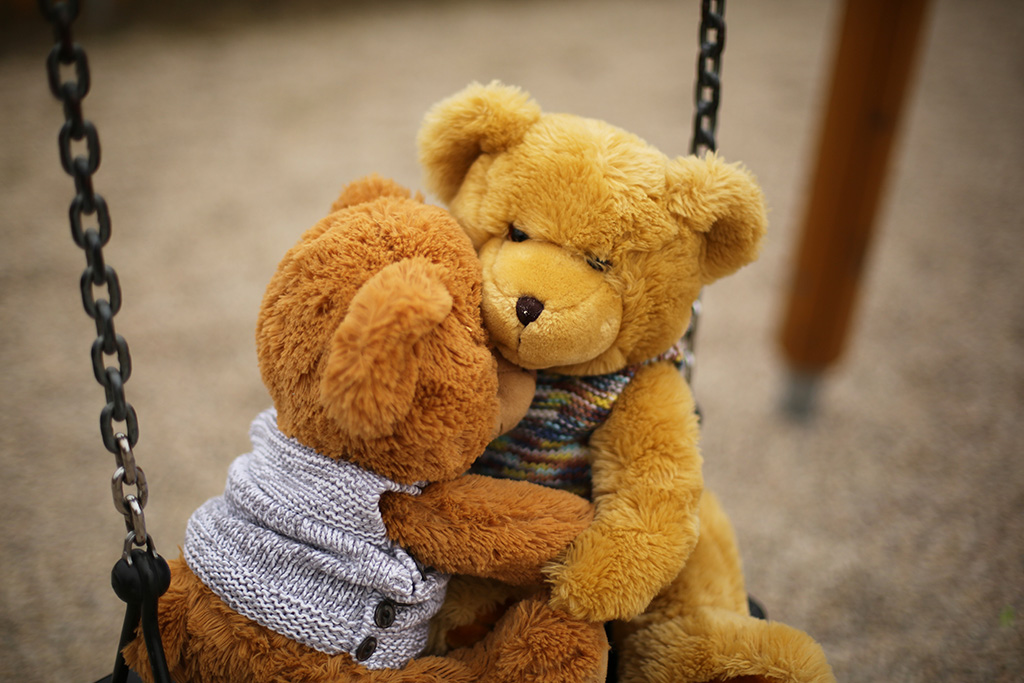
– Remind and show your children that you are there for them and that you love them
It is most beneficial to try and keep in mind that when children feel uncomfortable or anxious, they would need the supportive and calming presence of their parents in these moments more than ever. This means that if they are holding ‘back’, then we would be able to help them by showing them that we understand how they are feeling and that they are ‘safe’, together with the fact that we love them. The more that we push them forward in an excessive manner, and do not show empathy, the greater the chance that children will tend to remain anxious while they are with us, and thus they would not want to budge from our vicinity. Whereas, on the other hand, when we accept the emotions that they are feeling, as well as show them that we are always there for them, and further calm them down and let them decide when it would be time for them to explore and socialise with others, there is a larger possibility that eventually they will do just so. When they are in a calm state of mind, where the children would moreover be more verbal as well, we may also investigate together with them what might be weighing heavily on their minds, and thus see together what would be able to help them. Children should never be punished for something that they are feeling. Every emotion is important and valid.

– For those children who tend to show greater sensitivity to a change in routine it is important that we discuss with them on how we are going to structure our day
For some children it might be of additional assistance that there is a certain element of routine, even during the festive season. This also includes access to food that children love and that they are accustomed to, especially for those children who show greater sensitivity towards trying out and accepting new foods. Keep in mind that when children are hungry there is a greater chance of ‘meltdowns’. This is one of the reasons why I always try to keep some nutritious ‘snacks’ on me, either in my pocket or in my bag. 😀
– Talk with your children about how, where and when they would prefer to open the presents that they receive
For those children who are feeling more stimulated, and/or even those who are somewhat more sensitive in nature, it might be that they feel more self-conscious at that particular moment where they would be expected to open the gifts that they have received. Although in certain cases there may be a certain amount of pressure to open the presents right away, it could be that our children would not be necessarily comfortable with the fact that everyone would be looking at them whilst they are doing so. A viable alternative could be that you reach an agreement with the children themselves as on a suitable and a quieter time, during which they would be able to open the aforementioned presents, where a photo or video of your children with the gifts themselves could then still be sent over to the person, or instead the group of persons, who had given them the presents. It is important to keep in mind that children are all different, and it further helps that we understand their individual personality and temperament. It is also most beneficial that we teach them the importance of appreciating every gift that we receive, as well as always showing our gratitude.
I hope that these ideas will prove somehow useful to you. Try to also keep in mind that nothing is guaranteed to work at any given time and at any given moment. However, at the same time it helps that we remain open to additional information received, as well as conversations carried-out with others, which help us to be able to reflect further as on what we, as parents, can do differently, in order to be able to continue providing the best that we can for our children!

Charlene
Clinical Psychologist and Family Therapist
